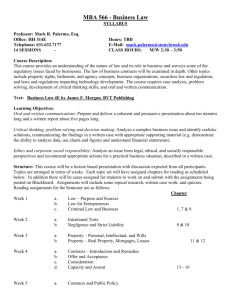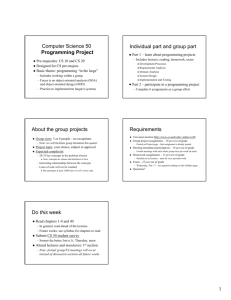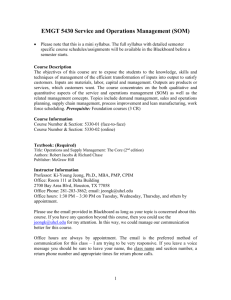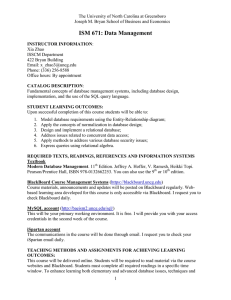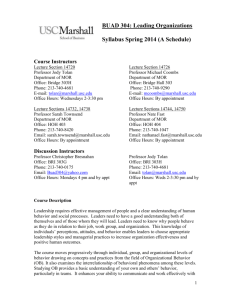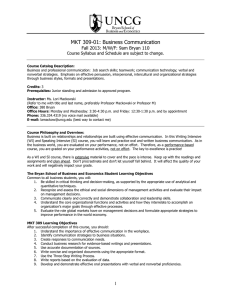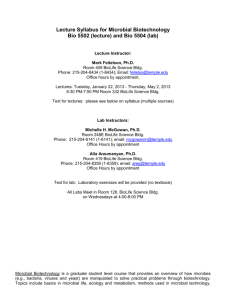Economics of American Industry
advertisement
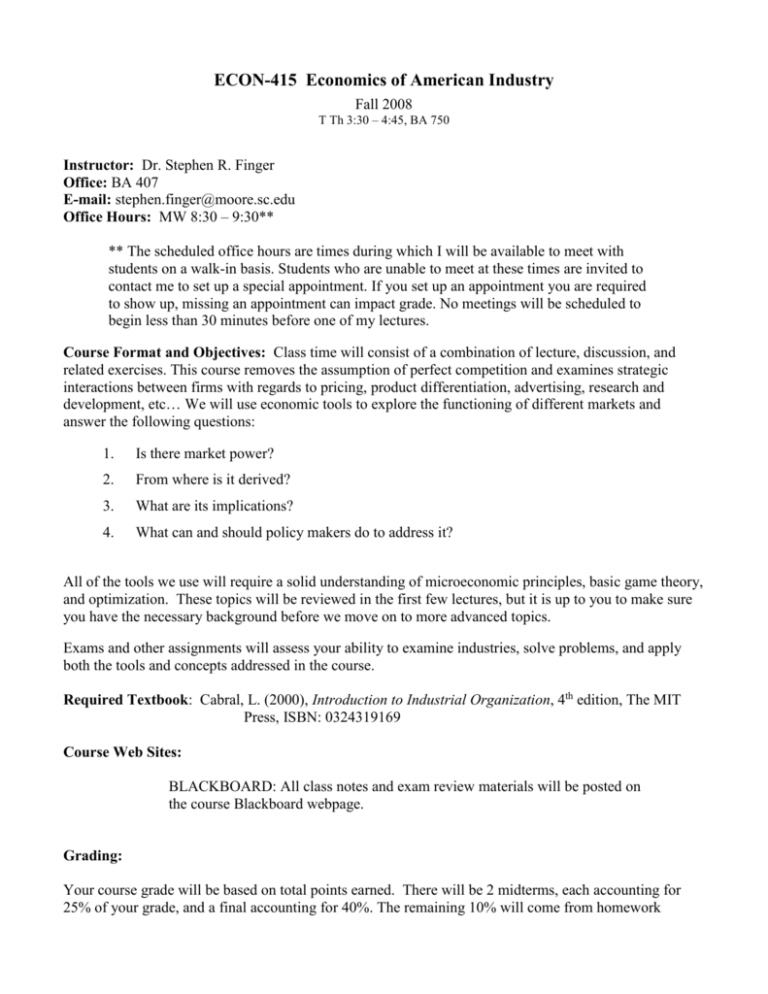
ECON-415 Economics of American Industry Fall 2008 T Th 3:30 – 4:45, BA 750 Instructor: Dr. Stephen R. Finger Office: BA 407 E-mail: stephen.finger@moore.sc.edu Office Hours: MW 8:30 – 9:30** ** The scheduled office hours are times during which I will be available to meet with students on a walk-in basis. Students who are unable to meet at these times are invited to contact me to set up a special appointment. If you set up an appointment you are required to show up, missing an appointment can impact grade. No meetings will be scheduled to begin less than 30 minutes before one of my lectures. Course Format and Objectives: Class time will consist of a combination of lecture, discussion, and related exercises. This course removes the assumption of perfect competition and examines strategic interactions between firms with regards to pricing, product differentiation, advertising, research and development, etc… We will use economic tools to explore the functioning of different markets and answer the following questions: 1. Is there market power? 2. From where is it derived? 3. What are its implications? 4. What can and should policy makers do to address it? All of the tools we use will require a solid understanding of microeconomic principles, basic game theory, and optimization. These topics will be reviewed in the first few lectures, but it is up to you to make sure you have the necessary background before we move on to more advanced topics. Exams and other assignments will assess your ability to examine industries, solve problems, and apply both the tools and concepts addressed in the course. Required Textbook: Cabral, L. (2000), Introduction to Industrial Organization, 4th edition, The MIT Press, ISBN: 0324319169 Course Web Sites: BLACKBOARD: All class notes and exam review materials will be posted on the course Blackboard webpage. Grading: Your course grade will be based on total points earned. There will be 2 midterms, each accounting for 25% of your grade, and a final accounting for 40%. The remaining 10% will come from homework assignments. Note: Only in extreme circumstances will make up exams be given. Individual assignments and grades will NOT be curved. Course grades maybe curved at my discretion. Grading Scale A 100% - 91% B+ 90% - 88% B 87% - 81% C+ 80% - 78% C D+ D F 77% - 71% 70% - 68% 67% - 60% 59% or less Course Policies Attendance Policy: Attendance is not mandatory, but promptness is required. Overall, your presence in class is highly recommended, but is not required. Attending class regularly can only benefit your overall class performance. It is your responsibility to keep informed of class announcements or course changes that may be made during lectures. Also, entering class late or leaving early is extremely rude and disruptive to your classmates and the flow of the lecture. If you must leave class early please notify me prior to the beginning of the session. Academic Integrity: Students are encouraged to work together on problem sets and discuss their solutions (outside of class). There maybe practice problems that will be difficult to complete on your own. That is very common in economics (and in business). Use the resources around you to solve the exercises and LEARN the material. Students should not simply copy the problem set of a classmate nor should they allow others to copy their own work. All honor code rules of the university are in effect – even if not explicitly mentioned on each exam. Cheating will be punished. Expectations and General Orientation: The course will typically cover one to two topics per week. Material will come from the required text and from class notes that will be covered in class and posted on Blackboard. Homework assignments will be due roughly once a week depending on the pace of the course. Due dates will be announced in class and posted on Blackboard. It is up to you to know when assignments are due. Assignments are due at the BEGINNING of lecture. They may also be turned into my mail box 10 minutes BEFORE class begins. Students are asked to come to class prepared. At the least, please skim over your notes from the last class session to remind yourself where we are. Obviously, it would be better if you would do more than that—read all assignments, study your notes, identify questions you have, etc. Please come to my office hours or make an appointment to resolve any concerns or difficulties you may have at any point during the semester. The sooner you approach me about concerns the better off you will be and the easier they will be to resolve. Course Outline and Topics: 1. Intro to Industrial Organization Chapter 1 2. Micro and Optimization Review Chapters 2,3 3. Monopoly Chapter 5 4. Basics of Game Theory Chapter 4 5. Oligopoly Chapter 7 MIDTERM 1. September 18. 6. Product Differentiation Chapter 12 7. Price Discrimination Chapter 10 8. Entry Costs Chapters 14, 15 9. Collusion Chapter 8 MIDTERM 2. November 13. 10. Market Structure Chapter 9 11. Vertical Relationships Chapter 11 12. Advertising Chapter 13 13. Networks Chapter 17 14. Research and Development Chapter 16 FINAL: December 9. 9:00 AM

